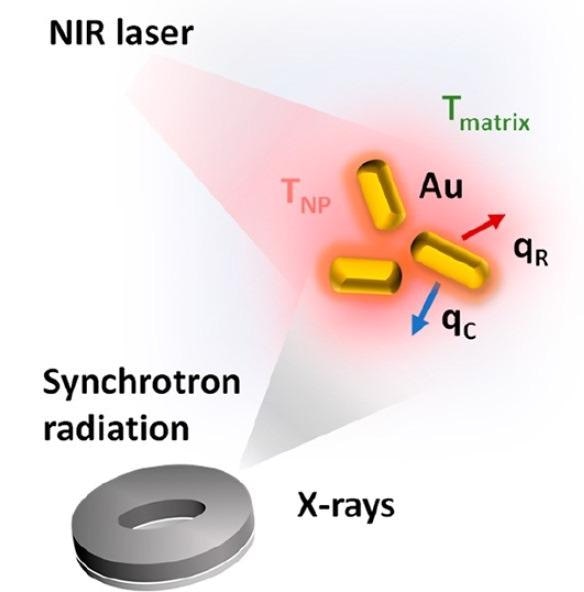Feb 10 2021
IMDEA Nanociencia researchers measure the nanoscale heating of gold-based nanoparticles and find high temperature variations within the nanoscopic volume.
 Photothermal excitation of gold-based nanomaterials : the nanoparticle absorbs NIR (near infrared) light resulting in a localized heating. X-rays act as a probe of the local temperature. Image credit: Nano Letters (ACS).
Photothermal excitation of gold-based nanomaterials : the nanoparticle absorbs NIR (near infrared) light resulting in a localized heating. X-rays act as a probe of the local temperature. Image credit: Nano Letters (ACS).
In hyperthermia treatments, the temperature is raised above physiological levels to induce the death of cancerous cells. The local application of hyperthermia is key for a successful treatment and to reduce damage to the healthy surrounding tissues. Going down to the nanoscale, nanoparticles can be used in hyperthermia treatments acting as nanoheaters and triggering cellular damage and/or inducing drug release in a selective manner.
The optimization of the heat capability of the nanoparticles is very important to better adjust the therapeutic thermal onset, since, in some cases, thermal healing effects may occurs though local heating without a macroscopic temperature rise. Measuring the nanoscale details of the heating in the surrounding of the nanoparticles is challenging; so far indirect methods have been tested. In their Nano Letters publication, Dr. Ana Espinosa (IMDEA Nanociencia), Dr. Álvaro Muñoz-Noval (UCM) and colleagues propose the measurement of the nanoscale heating of gold-based nanoparticles under hyperthermia conditions using X-ray absorption spectroscopy as an onsite and direct nanothermometric method.
The results reveal significant nanothermal gradients, it is, high temperature variations within a small volume and evidence a nanoscopic local temperature significantly higher than global temperature measurements. This method allows to measure the heating at the nanoscale for all types of particles and systems under hyperthermia exposure.
This work is an outcome of Dr. Ana Espinosa’s research group at IMDEA Nanociencia and has been partially funded by the Atracción de Talento Grant from Comunidad de Madrid, the Spanish Association Against Cancer (AECC), and the Severo Ochoa Excellence award to IMDEA Nanociencia (2017-2021).